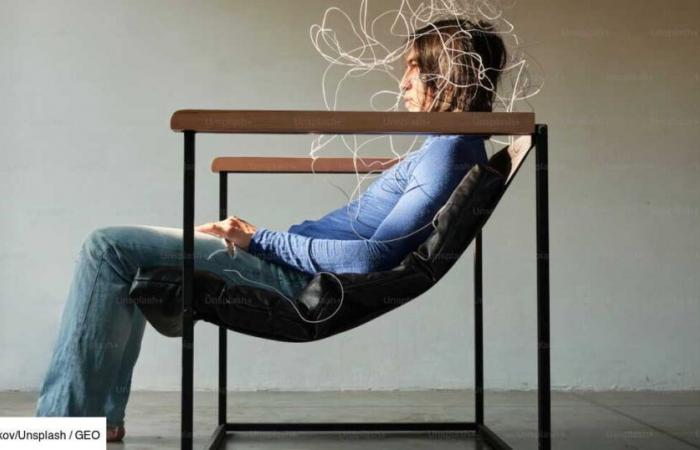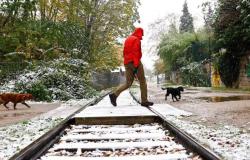Stress is a physiological adaptation response of the body that allows humans to react to their changing environment. Originally essential for maintaining our balance between mind and body, it can become disabling both physically and psychologically. It is then necessary to implement methods aimed at reducing it.
Take daily action to boost your immune system
Sophie Ugolini, research director at the Marseille-Luminy Immunology Center
As early as 1991, researchers established that a stressed person had less resistance to viral infections, but the mechanisms involved remained unclear. Inserm research director in immunology, Sophie Ugolini wanted to explore the subject further. “Scientists have long thought that the immune system has autonomous activity. I wondered if the nervous system played a role in its regulation,” explains the immunologist.
She was thus interested in so-called beta2-adrenergic receptors, specific for stress hormones, and present on immune cells. To discover their role, his team exposed two groups of rodents to a virus. Result: compared to normal mice, the survival rate was better in those lacking the famous receptor (90%, compared to 50%).
The explanation: “In these mice, immune cells produce more inflammatory cytokines, molecules that promote the elimination of the virus.” In the presence of beta2-adrenergic receptors, stress hormones therefore reduce this mode of defense. The team, which published its results in 2020 in the Journal of Experimental Medicine, continues its exploration of the mechanisms of neuroimmunology with a view to therapeutic perspectives.
Cultivate optimism to strengthen the heart
Jean-Pierre Houppe, cardiologist, expert at the French Federation of Cardiology
The link between stress and heart problems is no longer in doubt. In a European study published in 2012 in the British journal The Lancetresearchers have, for example, shown that stressed people have a 23% higher risk of having a heart attack than others. By activating the amygdala, an area of the emotional brain, stress triggers a cascade of reactions favoring the formation of plaques in the arteries, the cause of their obstruction, and therefore of a heart attack.
For several years, cardiologist Jean-Pierre Houppe, expert at the French Federation of Cardiology, has gone further: he has highlighted the importance of psychosocial factors (pessimism, anxiety, burn-out, depression, insecurity, isolation, etc.) in diseases. cardiovascular. “Psychosocial stress is a major risk factor for heart attacks, the third behind tobacco and cholesterol. And more and more among women, from 35-40 years old,” warns this specialist, recently retired, who invented the term “psychocardiology”.
In his book The Heart of Happiness (Dunod, 2019), this expert, also a sophrologist, advocates “holistic cardiac prevention”. Namely quitting smoking, practicing physical activity, working on breathing (meditation or other)… and cultivating optimism.
Take care of your microbiota to stay calm
Pierre-Marie Lledo, neurobiologist at the CNRS and the Pasteur Institute
Since the discovery of the complexity of the microbiota around twenty years ago, scientists have sought to understand its link with the brain. In particular, they found that people suffering from depression, an illness often linked to stress, presented imbalances in this area.
Work carried out by researchers from the Institut Pasteur, Inserm and CNRS, published in 2020 in the journals Cell Reports et Nature Communication allowed us to find out more. The teams, led by Pierre-Marie Lledo, head of the Perception and Memory unit at the Institut Pasteur, and Gérard Eberl, head of the Microenvironment and Immunity unit (Institut Pasteur/Inserm), analyzed the intestinal microbiota of mice subjected to chronic stress and became depressed, then transferred it to a group of ordinary rodents.
Result: they became stressed and depressed. “Stress depleted the microbiota of bacteria producing an amino acid precursor to serotonin, the happiness hormone,” explains Pierre-Marie Lledo. Likewise, the presence of another type of lactobacilli was reduced, on which the production of endogenous cannabinoids (molecules similar to those of cannabis) depends, which are also the cause of depression. A discovery that demonstrates how the intestinal microbiota contributes to the normal functioning of the brain.
Practice meditation to regulate your emotions
Soizic Michelot, mindfulness teacher
In 1979, American biologist Jon Kabat-Zinn created secular meditation. Since then, its MBSR program (English acronym for “stress reduction through mindfulness”), whose effectiveness has been recognized by numerous studies for more than ten years, has been distributed in thousands of hospitals, companies and schools around the world.
A former specialist educator, Soizic Michelot has been teaching it for nine years in Paris, notably to medical students at the University of Paris, in collaboration with oncologist Cloé Brami, who is preparing a thesis on meditation at the Center for Interdisciplinary Research. “The practice helps regulate stress and reduce ruminations because it teaches you to live in the present and welcome your own experiences,” explains the young woman, author of Meditate through art (ed. Albin Michel, 2021).
In fact, imaging studies show that it acts on brain areas involved in attention and emotions. When faced with a stressful situation, it facilitates the regulation of emotions, thus involving the synthesis of stress hormones. “Meditation goes beyond that. It is an art of presence to oneself, to others and to the world,” insists Soizic Michelot.
Learn to rebuild yourself after burnout
Sabine Bataille, work sociologist, coach and consultant
After eight years of research with thousands of people at Paris-Dauphine University, this work sociologist created, in 2012, the method of “post burn-out reconstruction”. Known as RPBO©️, it is one of the main programs used in France to help victims – nearly 100,000 in total, according to the Academy of Medicine – to escape from this process of professional burnout, both physical and mental, which survives after a long phase of stress.
In order to develop it, Sabine Bataille, author of Rebuilding yourself after burnout (ed. Dunod, 2019), a model of resilient pathways with a systemic vision. “It is not the individual who is sick, but the organizational ecosystem in which they are asked to adapt beyond reason,” she analyzes.
Result: his method, which takes place over six to ten sessions, is the only one to model the stages of reconstruction, represented on a graph with, horizontally, the axis of time – from stopping to “being able to act » – and, vertically, the axis symbolizing space – from the area of convalescence to that of the “I”. Its model, awarded in 2012 by Anact (National Agency for the Improvement of Working Conditions), is disseminated thanks to a network of 50 RPBO©️ experts who advise companies and support victims.
➤ Article published in the magazine GEO HORS-SERIE SCIENCES, Stress, burn-out, depression, from December 2021 – January 2022
➤ To see all GEO numbers available individually, click here ! Are you already loyal to GEO content? So to not miss anything, discover our formulas subscription to receive GEO at your home each month with ease.






